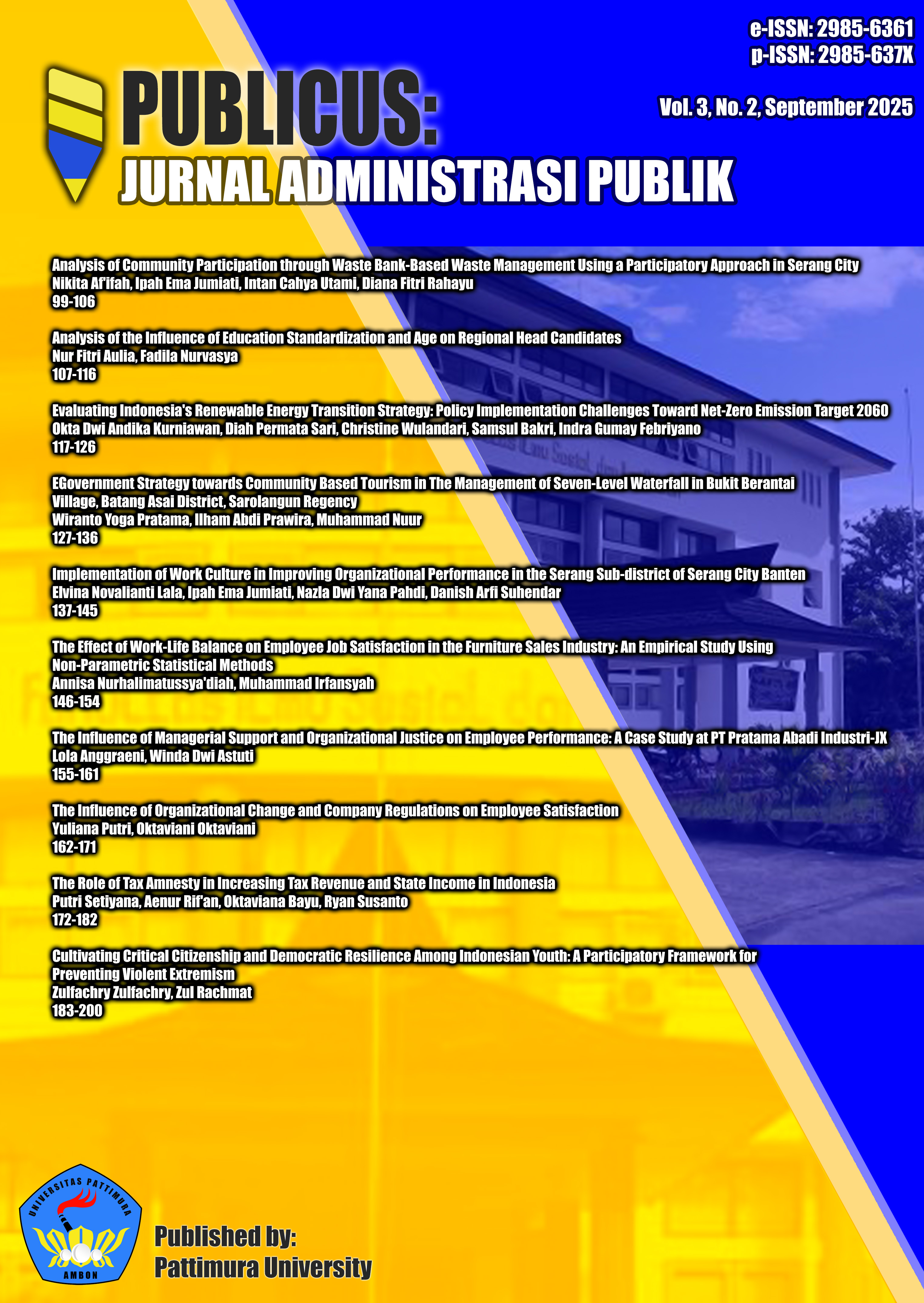The Effect of Work-Life Balance on Employee Job Satisfaction in the Furniture Sales Industry: An Empirical Study Using Non-Parametric Statistical Methods
Abstract
This study aims to analyze the effect of work-life balance on employee job satisfaction in the furniture sales industry. Data was collected using a Google Form questionnaire filled out by 75 respondents working in the furniture sales industry. The results of data analysis using SPSS showed that the data were not normally distributed, so non-parametric statistical methods were used for further analysis. Validity tests showed a significant positive correlation between work-life balance and employee job satisfaction (r = 0.574; p < 0.05). Reliability tests showed that the research instrument was reliable with Cronbach's Alpha values for work-life balance variable (α = 0.870), job satisfaction (α = 0.822), and employee loyalty (α = 0.788). Multiple regression analysis showed that work-life balance and job satisfaction significantly affect employee loyalty with R² = 0.672, meaning that 67.2% of the variation in employee loyalty is explained by these two variables. Job satisfaction proved to have a significant positive effect on employee loyalty (β = 0.662; p < 0.05). This study concludes that companies need to pay attention to the work-life balance of employees to improve their job satisfaction and loyalty. Policies such as flexible working hours, employee welfare programs, and mental health support can be effective strategies to achieve these goals.
Downloads
References
Allen, T. D., Golden, T. D., & Shockley, K. M. (2015). How effective is telecommuting? Assessing the status of our scientific findings. Psychological Science in the Public Interest, 16(2), 40–68.
Allen, T. D., Herst, D. E. L., Bruck, C. S., & Sutton, M. (2000). Consequences associated with work-to-family conflict: a review and agenda for future research. Journal of Occupational Health Psychology, 5(2), 278.
Byron, K. (2005). A meta-analytic review of work–family conflict and its antecedents. Journal of Vocational Behavior, 67(2), 169–198.
Chen, L., Liu, J., Yang, H., Ma, H., Wang, H., Huang, Y., Cheng, H., Tang, D., Liu, M., & Luo, H. (2018). Work-family conflict and job burn-out among Chinese doctors: the mediating role of coping styles. General Psychiatry, 31(1), e000004.
Choi, J., Kim, A., Han, K., Ryu, S., Park, J. G., & Kwon, B. (2018). Antecedents and consequences of satisfaction with work–family balance: A moderating role of perceived insider status. Journal of Organizational Behavior, 39(1), 1–11.
Clark, S. C. (2000). Work/family border theory: A new theory of work/family balance. Human Relations, 53(6), 747–770.
Dorenkamp, I., & Süß, S. (2017). Work-life conflict among young academics: Antecedents and gender effects. European Journal of Higher Education, 7(4), 402–423.
Locke, E. A. (1976). The nature and cause of job satisfaction. Handbook of Industrial and Organizational Psychology.
Greenhaus, J. H., & Beutell, N. J. (1985). Sources of conflict between work and family roles. Academy of Management Review, 10(1), 76–88.
Greenhaus, J. H., Collins, K. M., & Shaw, J. D. (2003). The relation between work–family balance and quality of life. Journal of Vocational Behavior, 63(3), 510–531.
Haar, J. M., Russo, M., Suñe, A., & Ollier-Malaterre, A. (2014). Outcomes of work–life balance on job satisfaction, life satisfaction and mental health: A study across seven cultures. Journal of Vocational Behavior, 85(3), 361–373.
Hill, E. J., Hawkins, A. J., Ferris, M., & Weitzman, M. (2001). Finding an extra day a week: The positive influence of perceived job flexibility on work and family life balance. Family Relations, 50(1), 49–58.
Judge, T. A., Thoresen, C. J., Bono, J. E., & Patton, G. K. (2001). The job satisfaction–job performance relationship: A qualitative and quantitative review. Psychological Bulletin, 127(3), 376.
Kossek, E. E., Perrigino, M. B., Russo, M., & Morandin, G. (2023). Missed connections between the leadership and work–life fields: Work–life supportive leadership for a dual agenda. Academy of Management Annals, 17(1), 181–217.
Lapierre, L. M., & Allen, T. D. (2006). Work-supportive family, family-supportive supervision, use of organizational benefits, and problem-focused coping: implications for work-family conflict and employee well-being. Journal of Occupational Health Psychology, 11(2), 169.
Michel, J. S., Kotrba, L. M., Mitchelson, J. K., Clark, M. A., & Baltes, B. B. (2011). Antecedents of work–family conflict: A meta‐analytic review. Journal of Organizational Behavior, 32(5), 689–725.
Moen, P., Kaduk, A., Kossek, E. E., Hammer, L., Buxton, O. M., O’Donnell, E., Almeida, D., Fox, K., Tranby, E., & Oakes, J. M. (2015). Is work-family conflict a multilevel stressor linking job conditions to mental health? Evidence from the work, family and health network. In Work and family in the new economy (Vol. 26, pp. 177–217). Emerald Group Publishing Limited.
Saeed, H., & Siddiqui, D. A. (2021). How Self Restrain Affects Life and Job Satisfaction, and Work-Life Balance: The Mediating Role of Impulse Control, Suppression of Aggression, Responsibility, Consideration, Delinquency, and Aggression. Suppression of Aggression, Responsibility, Consideration, Delinquency, and Aggression (October 14, 2021).
Valcour, M. (2007). Work-based resources as moderators of the relationship between work hours and satisfaction with work-family balance. Journal of Applied Psychology, 92(6), 1512.
Zheng, C. (2024). Introduction to an international perspective of work-life balance, employee health and wellbeing. In Work-life Balance, Employee Health and Wellbeing (pp. 1–24). Edward Elgar Publishing.
Copyright (c) 2025 Annisa Nurhalimatussya'diah, Muhammad Irfansyah

This work is licensed under a Creative Commons Attribution 4.0 International License.





.png)




